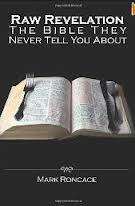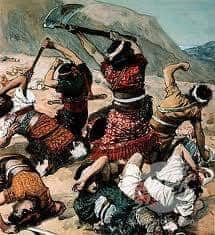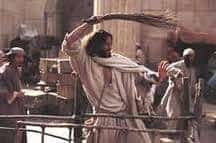 Today’s post is a brief interview with Mark Roncace (Ph.D. Emory University), associate professor of religion at Wingate University in North Carolina. He recently published Raw Revelation: The Bible They Never Tell You About
Today’s post is a brief interview with Mark Roncace (Ph.D. Emory University), associate professor of religion at Wingate University in North Carolina. He recently published Raw Revelation: The Bible They Never Tell You About. The book is aimed at everyday readers of the Bible who have come to see that the Bible raises it’s own difficult questions. Roncace’s book is a witty, readable, and straightforward invitation to believers to resist the attractively packaged and processed Bible they are often exposed to and dig in and deal honestly with its challenges. The book is divided into 6 main sections and covers over 50 issues in just over 200 pages.
Roncace’s other books are Teaching the Bible through Popular Culture and the Arts, Global Perspectives on the Bible
, and Jeremiah, Zedekiah, and the Fall of Jerusalem: A Study of Prophetic Narrative
.
I should to add that 100% of the proceeds from Raw Revelation will be given to international Christian organizations.
Why did you write this book?
The Bible is a wonderful and great book in many places—inspiring, uplifting, and encouraging. But in other places it is very difficult—dark, violent, confusing. Most people have some sense that the Bible is not an easy book.
But I am not sure they appreciate the extent of the difficulties, the breadth and depth of the challenges that the Bible presents for us. And in a way it’s not their fault. People are busy; life is hectic; it takes valuable time and energy to read and think about Scripture. So most people don’t.
And the institutional church, it seems, is more or less happy to keep it that way, because the Bible is indeed a gritty, bloody, messy book. So preachers either avoid the raw texts, or they cook them up with simple answers to make them more palatable.
Thus, I wanted to write an accessible (entertaining, even) book that presents the uncensored, unprocessed Bible, so that people might encounter the truth, the whole truth, and nothing but the truth about Scripture, so help us God.
Bible, so that people might encounter the truth, the whole truth, and nothing but the truth about Scripture, so help us God.
What makes your book different?
The book pulls no punches. It’s hard hitting and brutally honest. Brutally. But I write from within the Christian tradition, not outside of it. I am certainly not bashing the Bible, like other books, but nor is my goal to provide solutions to the problems and challenges of Scripture, as others have tried to do. I am being as real and raw as I can—because that is what I think God would want.
I am trying only to set the table, and then let the reader do the feasting on the Word. Other books either try to crash the party or they tell people which foods to eat and which ones to avoid or they run around putting chocolate icing on everything that might taste bad. I cannot imagine that God likes either one of those approaches.
So I just lay it out there. When Scripture says that God hated Esau before he was born, we should perhaps interpret that to mean that God hated Esau before he was born. When God declares that he is going to beat the daylights out of his wife Israel, that sounds misogynistic. When Jesus blesses those who make themselves eunuchs for the kingdom of God, we should consider that Jesus is condoning self-castration. When Jesus tells us to love our enemies and then slanders their sexual morality (“wicked and adulterous”) and their pedigree (“brood of vipers” i.e. “children of snakes” i.e. “sons of the devil”), that should give us pause.
Divine hate, misogyny, castration, and cursing are not popular topics. You can see why I had trouble getting a Christian publisher to take this book.
What is the main goal of the book? What do you want readers to take away?
I simply want people to engage the messy, complex, unpalatable parts of the Bible—because they too are every bit as much a part of Scripture as the good, happy passages that we like to dwell on. I hope that the book spurs people to read the Bible for themselves and to think openly, honestly, and carefully about it.
What readers conclude about the tough passages really does not matter—as long as they wrestle and struggle and strive with the Word. To me, that process is a big part of a life of faith. So what I would like readers to say when they finish the book is: “Wow, there’s a lot more to the Bible than I realized, and in some cases a lot less (like clear answers to big questions). I’ve got to do some relationship-building with God as I grapple and argue with God’s Word.”
How do you think people will respond?
Some Christians, no doubt, will say that I’ve gone too far. And I understand that. But I am hopeful that most will “get” it. For those who don’t, I would cautiously and gently note that Jesus himself accused the religious leaders of his day—the scribes and Pharisees—of mishandling Scripture to promote their own  agenda. Jesus was not a conservative or mainstream Jew. Like many of the Old Testament prophets, he was the outsider, the gadfly. One of the remarkable aspects of our tradition is that it is filled with counter voices.
agenda. Jesus was not a conservative or mainstream Jew. Like many of the Old Testament prophets, he was the outsider, the gadfly. One of the remarkable aspects of our tradition is that it is filled with counter voices.
But what if some people read the book and end up losing their faith or rejecting Christianity? Isn’t it too risky?
In the process of engaging the Word, some people may not be able to swallow it raw. The may end up spitting it back out, rejecting it. While this will be a rare result, and certainly not the desired one, it is a possibility for which we must allow—otherwise an authentic quest for truth and for a genuine life of faith is compromised. That is, it’s a risk one must take in order to have a meaningful, robust faith.
What would you say to people who are sympathetic to your approach, but conclude that “there are some parts of Scripture we will never understand”?
While I understand that thinking, I must confess that it strikes me as somewhat disingenuous. How can we claim to understand the text when it says, “God is loving and merciful and long-suffering,” but then when it says, “God commanded the Israelites to kill all the women and children,” we throw up our hands, shrug our shoulders, and say, “God works in mysterious ways”? That is not being honest with ourselves and the Word, is it? We understand what we like and, conveniently, don’t understand what we don’t like?
Any final thoughts?
If you are unsure about the book, try reading the end first, the short “Final Suggestions” chapter. Maybe I should have begun with those words instead of ending with them. The objective there is to establish a positive, supportive context of faith for readers, without, of course, watering down the difficulties that one will encounter while partaking of God’s raw Revelation.
